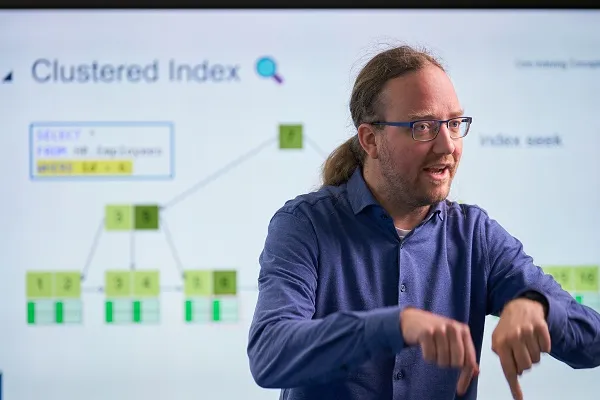course
Advanced Querying Data with Transact-SQL
Extend your T-SQL knowledge to write optimal queries
Description
You learn to use advanced features of Transact-SQL. This will enable you to consider different solution strategies to solve business questions, leading to a more optimal solution.
Prior Knowledge
Subjects course:MSDP080
Subjects
- Refresher
- Table Expressions
- Set Operators
- Window Ranking, Offset and Aggregate Functions
- Pivot Tables and Grouping Sets
- Programming with T-SQL
Refresher
In this module we will make sure everyone remembers the basics of querying and we can continue at the same level. Goals:
- Standard elements of a SELECT query
- Joins
- Grouping & Aggregating
- Subqueries
Table Expressions
Table expressions are SQL elements that are not a table but can (mostly) be used as if they were in fact a table. Goals:
- Views
- Table Valued Functions
- Derived Tables
- Common Table Expressions (CTE)
- Apply
- When to pick which option?
Set Operators
Set Operators allow you to vertically combine and compare two similar result sets. This contrasts joins, where you are horizontally combining data. Goals:
- UNION (ALL)
- EXCEPT / INTERSECT
Window Ranking, Offset and Aggregate Functions
Window functions are ideal for many analytics scenarios like running totals and moving averages. They also allow you to 'time travel' to previous or following values in your result set. Goals:
- Window Functions
- Window
- Frame
- Partition By
Pivot Tables and Grouping Sets
Pivot Tables are often needed to exchange data between different systems. Grouping Sets can help when offering analytic data - in a single query you can cover multiple different queries at once. Goals:
- PIVOT
- UNPIVOT
- GROUPING SETS
- GROUP BY CUBE/ROLLUP
Programming in T-SQL
You can use T-SQL to write queries, but it is also possible to program in t-sql. Why would you need this in a database and what is the syntax? And how do Stored Procedures fit into this? Goals:
- Batches
- Variables
- Using Stored Procedures
- Control of Flow
- Errors and Error Handling
- Transactions
Schedule
| Start date | Duration | Location | |
|---|---|---|---|
December 18, 2025December 19, 2025 | 2 days | Utrecht / Remote This is a hybrid training and can be followed remotely. More information Utrecht / Remote This is a hybrid training and can be followed remotely. More information | Sign up |
January 5, 2026January 6, 2026 | 2 days | Utrecht / Remote This is a hybrid training and can be followed remotely. More information Utrecht / Remote This is a hybrid training and can be followed remotely. More information | Sign up |
January 8, 2026January 9, 2026 | 2 days | Utrecht / Remote This is a hybrid training and can be followed remotely. More information Utrecht / Remote This is a hybrid training and can be followed remotely. More information | Sign up |
February 16, 2026February 17, 2026 | 2 days | Veenendaal / Remote This is a hybrid training and can be followed remotely. More information Veenendaal / Remote This is a hybrid training and can be followed remotely. More information | Sign up |
March 12, 2026March 13, 2026 | 2 days | Utrecht / Remote This is a hybrid training and can be followed remotely. More information Utrecht / Remote This is a hybrid training and can be followed remotely. More information | Sign up |
All courses can also be conducted within your organization as customized or incompany training.
Our training advisors are happy to help you provide personal advice or find Incompany training within your organization.
Trainers
Prior knowledge courses
"Extremely good teacher"Sander
-
Hoge waardering
-
Praktijkgerichte trainingen
-
Gecertificeerde trainers
-
Eigen docenten





